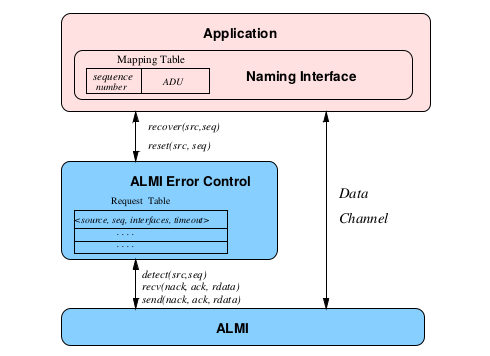
Links
Abstract
The IP multicast model allows scalable and efficient multi-party communication, particularly for groups of large size. However, deployment of IP multicast requires substantial infrastructure modifications and is hampered by a host of unresolved open problems. To circumvent this situation, we have designed and implemented ALMI, an application level group communication middleware, which allows accelerated application deployment and simplified network configuration, without the need of network infrastructure support. ALMI is tailored toward support of multicast groups of relatively small size (several 10s of members) with many to many semantics. Session participants are connected via a virtual multicast tree, which consists of unicast connections between end hosts and is formed as a minimum spanning tree (MST) using application-specific performance metric. Using simulation, we show that the performance penalties, introduced by this shift of multicast to end systems, is a relatively small increase in traffic load and that ALMI multicast trees approach the efficiency of IP multicast trees. We have also implemented ALMI as a Java based middleware package and performed experiments over the Internet. Experimental results show that ALMI is able to cope with network dynamics and keep the multicast tree efficient.
BibTeX (Download)
@inproceedings{Pendarakis2001ALMI,
title = {ALMI: An Application Level Multicast Infrastructure},
author = {Dimitris Pendarakis and Sherlia Shi and Dinesh Verma and Marcel Waldvogel},
url = {https://netfuture.ch/wp-content/uploads/2001/pendarakis01almi.pdf},
year = {2001},
date = {2001-03-01},
urldate = {1000-01-01},
booktitle = {Proceedings of the 3rd USENIX Symposium on Internet Technologies and Systems (USITS '01)},
pages = {49-60},
address = {San Francisco, CA, USA},
abstract = {The IP multicast model allows scalable and efficient multi-party communication, particularly for groups of large size. However, deployment of IP multicast requires substantial infrastructure modifications and is hampered by a host of unresolved open problems. To circumvent this situation, we have designed and implemented ALMI, an application level group communication middleware, which allows accelerated application deployment and simplified network configuration, without the need of network infrastructure support. ALMI is tailored toward support of multicast groups of relatively small size (several 10s of members) with many to many semantics. Session participants are connected via a virtual multicast tree, which consists of unicast connections between end hosts and is formed as a minimum spanning tree (MST) using application-specific performance metric. Using simulation, we show that the performance penalties, introduced by this shift of multicast to end systems, is a relatively small increase in traffic load and that ALMI multicast trees approach the efficiency of IP multicast trees. We have also implemented ALMI as a Java based middleware package and performed experiments over the Internet. Experimental results show that ALMI is able to cope with network dynamics and keep the multicast tree efficient. },
keywords = {Multicast, Peer-to-Peer},
pubstate = {published},
tppubtype = {inproceedings}
}



